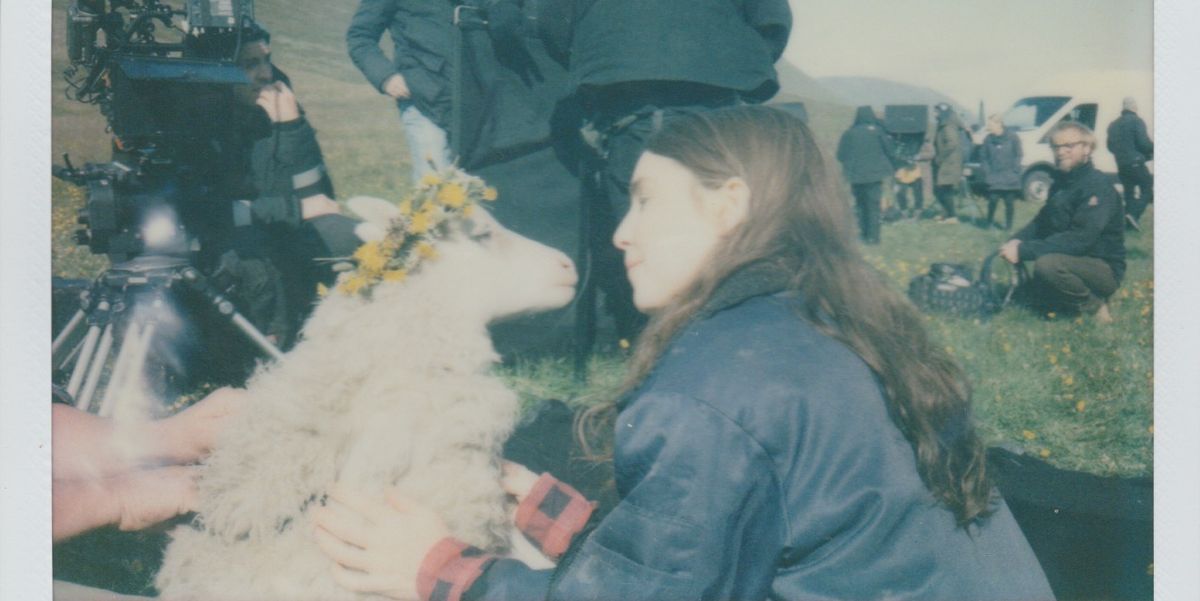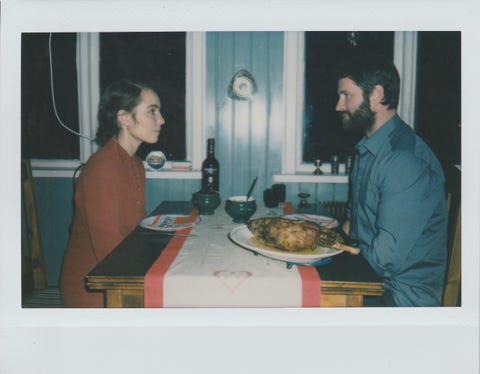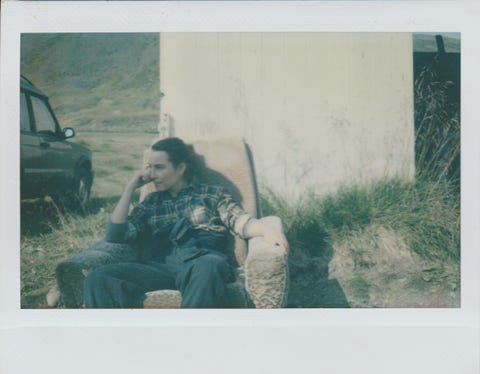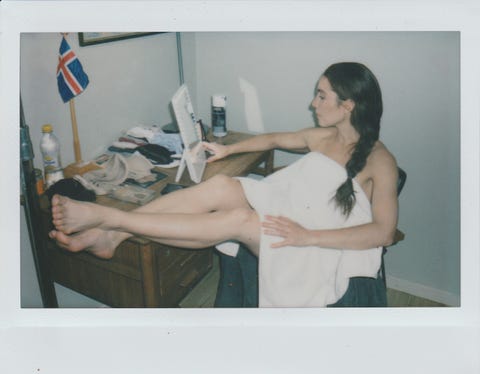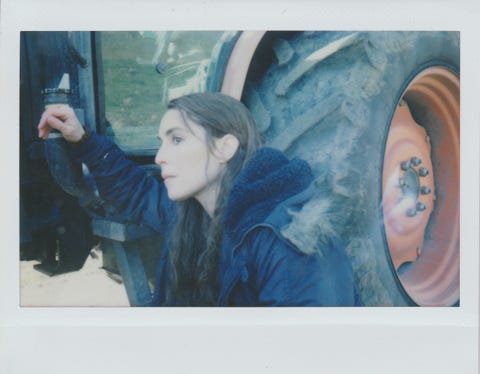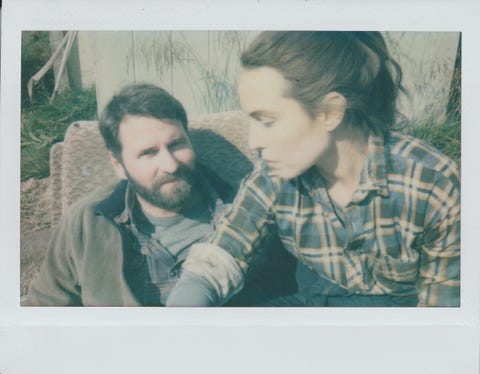Spoilers for Lamb ahead.
Several long months ago, Noomi Rapace couldn’t even fathom sitting on a Zoom session in New York City, chatting with someone about her experience working on the idiosyncratic new film, Lamb. That’s because she had sunk so deeply into her role as Maria—one half of a melancholy, flannel-wearing couple living on an outlying farm in Iceland whose life irrevocably changes with the birth of a human-lamb hybrid—that the actress was no longer detectable, even to those who know her best.
“I felt like I was hijacked by her,” Rapace recalls, completely transformed with a beautiful red and black polka dot button-up, bright red lips and long, elegant black braid swung across her left shoulder. “I didn’t see anyone else that summer. I couldn’t really talk to anyone. I remember FaceTiming with my son at some point. He was like, ‘Ma, you look really strange. And you don’t sound like yourself.’ And I was like, ‘I know.’”
She connected with the character in ways she never quite anticipated going into the unsettling family drama (directed and co-written by Valdimar Jóhannsson along with screenwriter Sjón). It’s to the point where even today she sometimes says “me” or “my” when referring to Maria’s life and story. It’s not just the obvious things that tie together Rapace and Maria—both are mothers who have lived and raised animals on Icelandic farms—it’s what lies beneath that surface. Like the fact that both women act on inherently primal, shocking maternal urges.
For Maria, that means instinctually raising Ada, a lamb child, as her own with husband Ingvar (Hilmir Snær Guðnason) and doing whatever it takes—even murder—to protect her new family. And likewise, for Rapace, it’s going beyond her moral compass to preserve what matters to her. “It’s in those moments [when] I feel like the animal in me kicks in and I’m not rational anymore,” Rapace says. “I’m not sophisticated. I’m not verbal.”
Here, the actress reflects on how “slaughter time” and other experiences growing up on a farm shaped her views on mortality and motherhood, isolation as a means for justification, and finding freedom with Lamb.
You’ve said, “We are all driven in our lives by our animal natures.” How did that ideology influence your interpretation of Maria and how you yourself navigate the world?
The moments I felt the strongest were me being a mother. My son is now 18. So, I forget he’s a young man. He’s a massive man [Laughs]. It’s in those moments I feel like the animal in me just kicks in and I’m not rational anymore. I’m not sophisticated. I’m not verbal. There was a moment when he was in school many years ago, someone was mean to him and I was like, [she twists her face and scrunches her hands into fists] “I’m going to…”. [Laughs] Like, that’s my baby!
There was a couple of times when we shot Lamb when I felt like Maria’s deeply rooted primal need to be a mother just overrides everything else. When Ada is born, that becomes the bridge from my grief—my emotional life that is on pause—and becomes the ticket out of it. When the mother sheep is calling for her baby, in my head, it’s my baby. I could feel that same primal instinct of protecting my baby that hit me when my son was seven or eight come back. I was like, Back off. It’s beyond words. It’s like your whole body is awake and you’re ready for battle to protect your child. I feel like we as humans, and especially being here in beautiful New York, we have all this technology and we’re so civilized and sophisticated and then we’re not actually at all.
It takes any little thing to send us flying off the handle.
Like, when there’s some kind of catastrophe happening or like when the Coronavirus hit, and everyone started fighting over toilet paper. It’s like, What is happening? We thought we were far ahead and actually well-behaved. Then we just protect our nest, fill [it] up with whatever is needed for our family, our babies. This movie really peeled off a lot of layers of me. I came back to a core sense of myself as a human. And I visited a lot of old decisions and memories and things I thought I was done with.
I can understand that. Maria is so protective of her child and untraditional family that she doesn’t want others around. She doesn’t want Pétur [Björn Hlynur Haraldsson], her brother-in-law, there. She even murders the lamb’s biological mother, which is certainly a primal, horrifying decision.
Yeah, because happiness and the possibility of healing is so fragile in the beginning. [She remembers something] I love this image. Do you know that when lobsters outgrow their shell, they swim in or trap themselves between rocks, and then they force themselves out of the old shell? It’s like skin underneath; really soft and tender. It’s an extremely painful process, and they force themselves out. They squeeze out of the old shell and are so vulnerable before this shell hardens yet again. I would almost say that Maria is going through the same process. She has this hard shell in the beginning of the film, and then she gets this possibility to start healing—this gift, the happiness of Ada who arrives. She’s squeezing herself out to enter life again and start to feel again. Then you see she makes love and dances, and welcomes lives back in.
I’m curious how you navigated the conflict of Maria being a woman who’s at once very protective of her family and of being a mother but kills the lamb’s mother, who is trying to protect her own as well.
I think there’s a combination of when someone is in pain, you feel like you’re being excused. You have the right to take and to use your toolbox to fix yourself. And if killing the mother sheep is one of them, then it needs to be done. When Valdimar invited me to do this film with him, we met in London. He came to my house. And from that point onwards, we were not psychological [about the story]. I felt like we went into it and just explored things. Then it just mapped out by itself. The character was guiding me, and I was following her navigation more than Noomi sitting at home and kind of—
Dissecting it.
It was out of my control. Maria took over my life. I remember FaceTiming with my son at some point. He was like, “Ma, you look really strange. And you don’t sound like yourself.” And I was like, “I know.” He was like, “Can you tell me about Maria?” I started telling him, and he’s like, “Okay, now it makes sense. Now I know why you look like that.” He knows me so well. So now he always like, “Okay, let’s talk about [the movie]. Who are you?” Looking back, I can clearly see the violent side of Maria, but I didn’t in the moment. I didn’t at all.
What was it like to wade in that gray morality with this character? Was it akin to freedom?
Yeah, freedom is the greatest proof of love. That’s what I’m trying to give my son. If you love someone, you will set them free. Valdimar did that for me. He gave me total freedom. He guided me and he was my curator. He was the captain of the vehicle. But at the same time, I was given a lot of freedom. So, I felt really safe and protected. But I allowed myself to swim out in deep waters. Because this character is holding back so much. It takes time for the audience to get to know her. Acting like you have this desire to communicate. I was like, “I want you to understand. What if I lose you halfway? And what if she’s not patient enough to wait for the third act, when you actually start understanding why Maria is the way she is?”
Because I felt safe and free at the same time, my fears were not there. I didn’t have any anxiety. I didn’t look at my stuff from the outside. I was not really aware of how I looked, came across. I was just inside each scene. And I didn’t really care what the camera was on and whose perspective and what was being picked up and what was being communicated. I felt like we were all living the story. We also shot it in a remote valley in the north of Iceland with no phone signal. It was within an hour to the nearest gas station. So, that itself brings you to a place where you’re just so in tune with your primal side. Sitting here talking to you felt totally alien back then.
The remote setting also removes any hint of judgment or validation of right and wrong. So, when Pétur arrives, it really rattles that world that Maria has meticulously curated for herself.
Yes, there’s no distractions before that. You can fully live your psychosis and embrace what you want, what your truth is. You make your truth the only truth. Then all of a sudden there’s an outsider stepping in and everything risks falling apart. That is something we can see with a lot of things in smaller scale in life. You have your connection with someone, and you make certain decisions and it’s safe as long as it stays within those walls. When you step out in the outside world and you can see everything and you get exposed, that’s when you can all of a sudden spot yourself and then you start doubting yourself.
Pétur is the audience, even though he has a lot of colors. But he is the sober eyes on the situation, which is a direct threat towards my happiness.
Without anybody else there, everything she does is with good cause.
Exactly, yeah.
How did your experience yourself growing up on a farm in Iceland, seeing life and death with animals, shape your own views on mortality as well as bringing life into the world?
We always we had lambs and sheep and stuff. Sheep are quite brutal. Let’s say they get four lambs. Quite often they keep three and push one away. Then that becomes a bottle lamb, basically. That’s what we call them. Me and my sister would take care of them over the summer; feed with the bottle and the lamb came inside. It was almost like a pet was hanging with us, following us everywhere. Then in September, it was slaughter time, and the lamb was killed. It was like lambing season.
That kind of awareness of life and death, birth and the end of life, it was so normal for me when I grew up. You can’t allow yourself to be too emotional about it. [With] farm life itself, death is always around. My dog got hit by car and died when I was 13. I didn’t want to live. I wanted to end my own life because he was my best friend. I feel when Valdimar presented this project to me with a strange, disturbing mood board, I was like, Oh my god, this is insane. I’ve got to do this. I called my team and was like, “I’m going to do this small Icelandic film about a half lamb half human baby. And there’s no budget, it’s a first-time director and it’s going to shoot in Iceland over the summer.” It takes me out for months and months and months. And everyone’s like, “Wait, what?” But it was love at first sight. I had no hesitation. I needed to do this film for many reasons.
You talked about freedom being a reason for doing this film, and the personal memories it ignited for you. But was its unusualness attractive to you as well?
For sure. I love watching films that are brave. I just watched Zola and last night when I was jet lagged at 3 A.M., I watched this film called—Oh god, what is it? Anyways, It’s a Mexican film. It’s really quite intense. It means “after darkness comes light” in Latin.
I have to look this up, because now I’m curious.
Hold on, hold on [grabs her phone nearby]. I need to do this. Sorry, I’m too obsessive about this stuff. Oh, Post Tenebras Lux! It won Cannes years ago. Did you find it?
Oh, I’ve totally heard of this film. I haven’t seen it, though I hear really good things.
It just put me in such a strange place. And I was like, Oh my god, I’m losing my mind.
In the best way, I hope.
In the best, best, best way. And I love those kinds of films. I like to question my own existence. I like to challenge myself—both as an actress but also as an audience. Lamb had all those ingredients. I’m very drawn to the simplicity of the film. It’s dealing with one thing at a time, but simultaneously really layered. You’re watching something that is so still and scaled off, but there’s an ocean of chaos underneath.
This interview was edited and condensed for clarity.
This content is created and maintained by a third party, and imported onto this page to help users provide their email addresses. You may be able to find more information about this and similar content at piano.io
